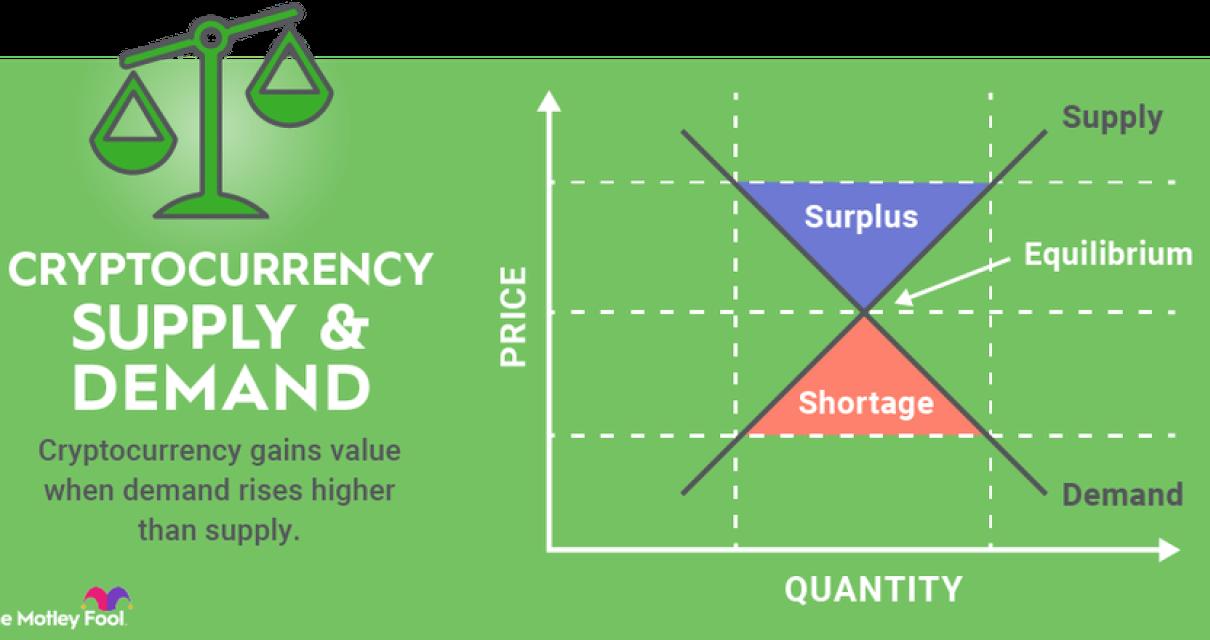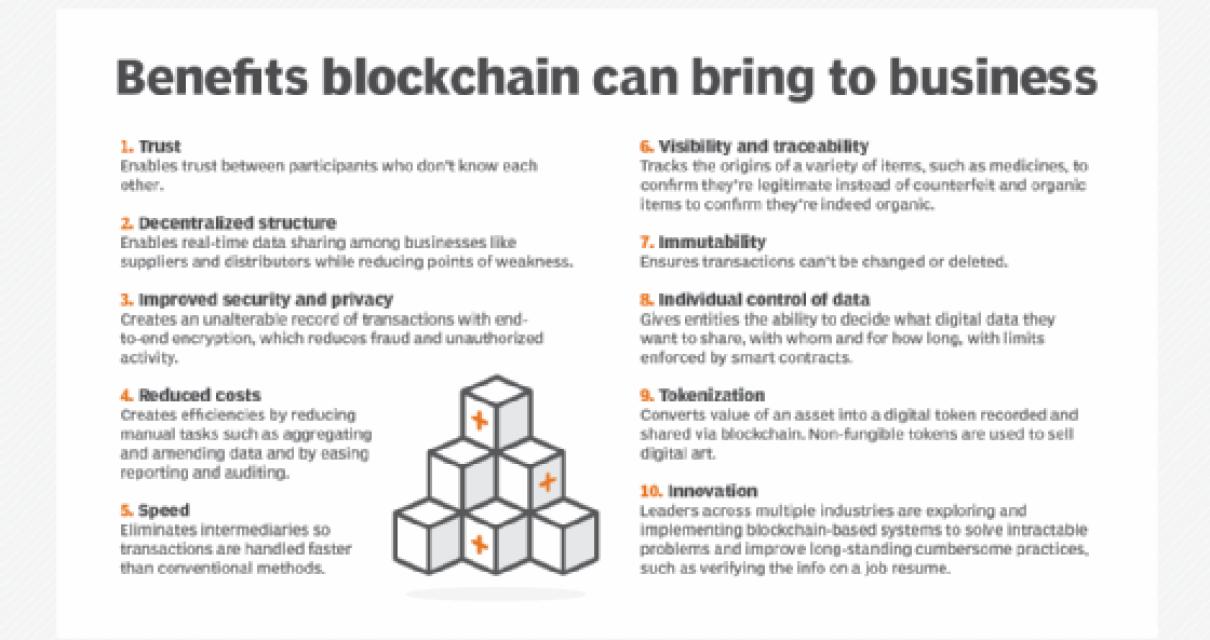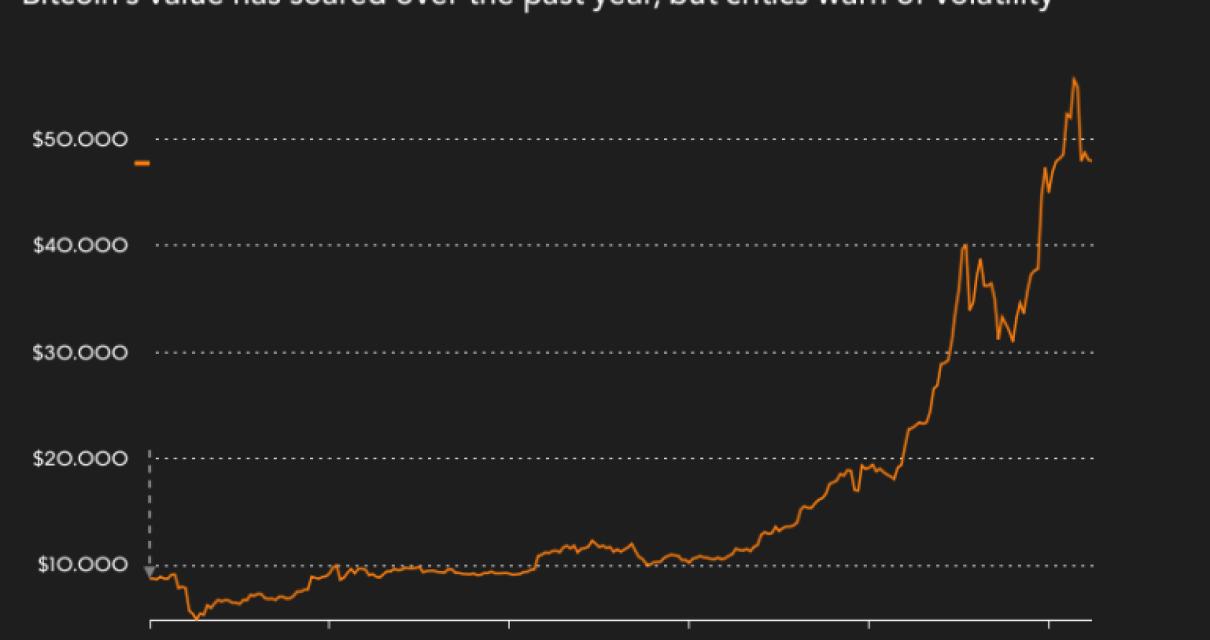The Benefits of Blockchain Technology
There are many benefits to blockchain technology, which can be summarized as follows:
1. It is secure: Blockchain technology is secure because it uses a distributed database that is protected by cryptography. This makes it difficult for anyone to tamper with the data or to hack into the system.
2. It is transparent: Blockchain technology is transparent because all the transactions that take place on it are publicly recorded. This makes it easy for anyone to see how much money is being spent and where it is being spent.
3. It is efficient: Blockchain technology is efficient because it allows transactions to be processed quickly and without the need for a third party. This makes it a useful tool for businesses that need to carry out transactions quickly and without spending a lot of time processing them.
4. It is affordable: Blockchain technology is affordable because it does not require a large amount of resources to run it. This means that it can be used by small businesses and individuals who do not have a lot of money to spend on equipment and software.
5. It is reliable: Blockchain technology is reliable because it has been tested over a period of years and has shown to be resistant to hacks and other attacks. This makes it a good choice for businesses that need to rely on a system that is going to be reliable and secure.
How Blockchain Can Help Businesses Grow
One of the most significant benefits of using blockchain technology in business is that it can help businesses to grow. For example, if a business is looking to expand into a new market, blockchain can be used to help them identify and track all the relevant data. This can help them to make more informed decisions about their business, and ultimately increase their profits.
Another benefit of using blockchain technology in business is that it can help to reduce the costs associated with transactions. For example, if a business needs to make a payment to a supplier, blockchain can help to reduce the time it takes to complete the transaction, as well as the costs involved. This can help to improve efficiency and profitability in the business.
Finally, blockchain technology can also help to improve security and trust in the business. For example, if a business needs to transfer funds between different accounts, blockchain can help to ensure that the transaction is secure and private. This can improve trust and confidence in the business, which can lead to increased sales and profits.
What is Blockchain Technology?
Blockchain technology is a distributed ledger technology that enables secure, transparent, and tamper-proof transactions. Transactions are grouped into blocks and chained together using cryptography. Each block contains a timestamp and a record of the transaction. The blockchain is constantly growing as “completed” blocks are added to it with a new set of recordings. Bitcoin and other cryptocurrencies are based on this technology.

How Blockchain Works
A blockchain is a digital ledger of all cryptocurrency transactions. It is constantly growing as "completed" blocks are added to it with a new set of recordings. Each block contains a cryptographic hash of the previous block, a timestamp, and transaction data. Bitcoin nodes use the block chain to differentiate legitimate Bitcoin transactions from attempts to re-spend coins that have already been spent elsewhere.
In Bitcoin, every transaction is broadcast to every node. Every node can verify the validity of each transaction. Bitcoin nodes use the block chain to differentiate legitimate Bitcoin transactions from attempts to re-spend coins that have already been spent elsewhere.
What is Bitcoin?
Bitcoin is a digital asset and a payment system invented by Satoshi Nakamoto. Transactions are verified by network nodes through cryptography and recorded in a public dispersed ledger called a blockchain. Bitcoin is unique in that there are a finite number of them: 21 million. Bitcoin is created as a reward for a process known as mining. They can be exchanged for other currencies, products, and services.
What is Ethereum?
Ethereum is a decentralized platform that runs smart contracts: applications that run exactly as programmed without any possibility of fraud or third party interference. Ethereum is a platform that enables developers to build and deploy decentralized applications.

What are Smart Contracts?
Smart contracts are self-executing, digital contracts between two or more parties that are designed to facilitate the performance of a transaction. A smart contract is encoded with the terms of the agreement and can be activated when all the necessary conditions are met. Once activated, the contract automatically proceeds with the stipulated steps. Smart contracts are unique in that they are not subject to government or judicial review.
How do Smart Contracts Work?
A smart contract is a collection of code that resides on a blockchain and interacts with other nodes on the network. When a party wants to make a transaction, they send a request to the blockchain network. The code in the smart contract will then execute specific actions when the conditions of the contract are met. For example, if someone wants to purchase a product from a store, they would send a request to the blockchain network to purchase the product. The code in the smart contract would then contact the store to make the purchase and would also send the buyer’s payment information to the store. The store would then send the product to the buyer and would receive payment from the buyer’s payment method.
What are the Advantages of Smart Contracts?
Smart contracts offer several advantages over traditional contracts. First, smart contracts are self-executing. This means that they will take care of all the details of the transaction without any need for human intervention. This is a major advantage because it eliminates the need for third parties, such as lawyers, to intervene in transactions. In addition, smart contracts are immune to fraud and manipulation. This is because they are coded with specific conditions that must be met before the contract can proceed. Finally, smart contracts are transparent. This means that everyone involved in the transaction can see the terms of the contract and can trust that it will be carried out as agreed.
What are the Disadvantages of Smart Contracts?
There are several disadvantages of using smart contracts. First, smart contracts are complex and require a high level of coding skills. This means that not everyone can create a smart contract. Second, smart contracts are not legal contracts. This means that they are not subject to government or judicial review. Third, smart contracts are susceptible to cyberattack. This is because they are coded with sensitive information, such as payment information, and can be easily accessed by criminals. Fourth, smart contracts are not always reliable. This is because they can be susceptible to bugs and glitches. Finally, smart contracts can be expensive to set up and implement. This is because they require a high level of security and cryptography expertise.
What is a DAO?
A DAO is a decentralized organization that works on a blockchain. It is a collection of smart contracts that allows users to interact with each other without the need for a central authority.

What is a DApp?
A DApp is a decentralized application. This means that the app runs on a network of computers and is not controlled by any one organization. DApps are often designed to be more secure and user-friendly than traditional apps.
Introduction to Blockchain Technology
Blockchain technology is a distributed database that allows for secure, transparent, and tamper-proof transactions. Transactions are verified by network nodes through cryptography and recorded in a public ledger. Bitcoin and other cryptocurrencies are based on blockchain technology.
Benefits of Blockchain Technology
Blockchain technology has a number of benefits that make it an attractive option for digital transactions. These benefits include:
Security: Blockchain technology is secure because transactions are verified by network nodes and recorded in a public ledger.
transactions are verified by network nodes and recorded in a public ledger. Transparent: Transactions on a blockchain are transparent, which means that all participants can see the details of the transactions.
transactions on a blockchain are transparent, which means that all participants can see the details of the transactions. tamper-proof: Transactions on a blockchain are tamper-proof, which means that they cannot be altered or canceled.
Blockchain technology has a number of benefits that make it an attractive option for digital transactions. These benefits include:
Advantages of Bitcoin and Other Cryptocurrencies
Bitcoin and other cryptocurrencies offer many advantages over traditional payment systems. These advantages include:
Decentralized: Bitcoin and other cryptocurrencies are decentralized, which means that they are not controlled by any one entity.
Bitcoin and other cryptocurrencies are decentralized, which means that they are not controlled by any one entity. Secure: Bitcoin and other cryptocurrencies are secure because they use cryptography to protect against unauthorized changes to the transactions.
Bitcoin and other cryptocurrencies are secure because they use cryptography to protect against unauthorized changes to the transactions. Anonymous: Bitcoin and other cryptocurrencies are anonymous, which means that users can remain anonymous when making transactions.
Bitcoin and other cryptocurrencies are anonymous, which means that users can remain anonymous when making transactions. Fast: Bitcoin and other cryptocurrencies are fast because they use blockchain technology to process transactions.
Bitcoin and other cryptocurrencies are fast because they use blockchain technology to process transactions. Cost-effective: Bitcoin and other cryptocurrencies are cost-effective because they are not subject to government regulation or financial institution charges.
The Future of Blockchain Technology
One of the most popular applications of blockchain technology is in the world of cryptocurrencies. Cryptocurrencies are digital or virtual tokens that use cryptography to secure their transactions and to control the creation of new units.
Cryptocurrencies are decentralized, meaning they are not subject to government or financial institution control. This has made them popular with individuals and businesses who want to avoid the risks associated with centralized systems.
Cryptocurrencies are also open-source, meaning that anyone can view the code used to create them and make changes if they wish. This makes them resistant to attack and allows for their widespread adoption.
Some other potential applications of blockchain technology include:
-The recording and management of digital assets such as property deeds and intellectual property
-The tracking and tracing of goods and products through the supply chain
-The facilitation of peer-to-peer payments
-The development of a trustless digital marketplace
As blockchain technology continues to evolve, it is likely that its applications will become even more diverse and widespread. In the meantime, businesses and individuals should be prepared for the potential disruptions this technology may cause.
The Potential of Blockchain Technology
There is no denying that blockchain technology has the potential to revolutionize the way we do business.
For example, it could help reduce the cost of transactions and make them more secure. It could also help to speed up the process of exchanging information.
And, of course, it could also help to reduce the overall risk associated with doing business.
Of course, there are also a number of other potential applications for blockchain technology.
For example, it could be used to create a digital ledger of all transactions. This would make it easier for parties to track the whereabouts of assets.
And it could also be used to create a system for issuing and managing digital tokens. This could be useful in a number of different contexts, including the creation of decentralized networks and the management of digital rights.
Overall, blockchain technology has a lot of potential – and it looks like it's only going to become more popular in the future.